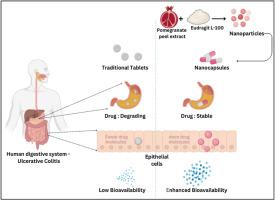Development of targeted nanocapsules using pomegranate peel extract with enhanced bioavailability and anti-inflammatory activity for ulcerative colitis: In vitro studies
引用次数: 0
Abstract
The study aimed to establish an accurate drug delivery system with a tailored mechanism for the efficient management of Ulcerative Colitis (UC). Using the solvent evaporation technique, nanoencapsulation of pomegranate peel extract (PPE) in biodegradable enteric polymer methacrylic acid-ethyl acrylate copolymer (Eudragit L-100) was prepared. In vitro drug release investigations indicated a greater percentage of drug released at 6.8 pH in contrast to 7.4 pH (96.98 ± 0.80 % vs. 93.97 ± 0.711 %), indicating its applicability in the region of the human intestine. The mechanism of drug release from the nanoformulations (NFR) exhibited a process controlled by Fickian diffusion. The results suggest efficient encapsulation of PPE within Eudragit L100 and may be used for targeted drug release in the intestinal region. Anti-inflammatory studies on the HIEC-6 cell line showed that tumour necrosis factor-α (TNF-α) expression was significantly (p < 0.001) decreased in all NFRs. Additionally, NFRs exhibited antioxidant activity and enhanced in vitro bioavailability (in intestinal pH compared to gastric pH).

利用石榴皮提取物开发具有增强生物利用度和抗炎活性的靶向纳米胶囊治疗溃疡性结肠炎:体外研究
本研究旨在为溃疡性结肠炎(UC)的有效治疗建立一个精确的药物输送系统。采用溶剂蒸发技术,将石榴皮提取物(PPE)包封在可生物降解的肠用聚合物甲基丙烯酸-丙烯酸乙酯共聚物(Eudragit L-100)中。体外释药试验表明,在6.8 pH下释药率高于7.4 pH(96.98±0.80%比93.97±0.711%),表明其在人体肠道区域的适用性。纳米制剂的药物释放机制受菲克扩散控制。结果表明,Eudragit L100可以有效地包封PPE,并可用于肠道靶向释放药物。对HIEC-6细胞株的抗炎研究表明,肿瘤坏死因子-α (TNF-α)的表达显著(p <;0.001),所有NFRs均下降。此外,NFRs还表现出抗氧化活性,提高了体外生物利用度(肠道pH值与胃pH值相比)。
本文章由计算机程序翻译,如有差异,请以英文原文为准。
求助全文
约1分钟内获得全文
求助全文

 求助内容:
求助内容: 应助结果提醒方式:
应助结果提醒方式:


